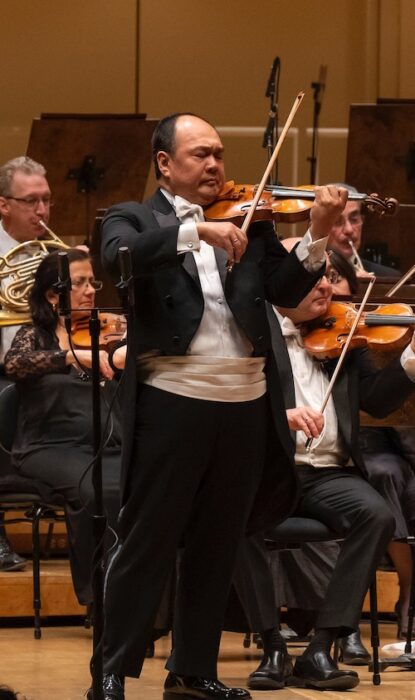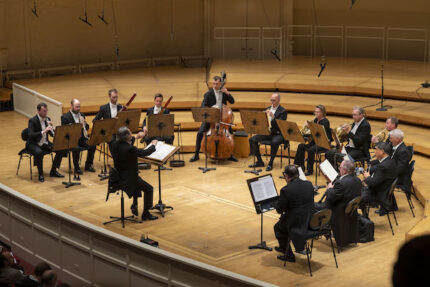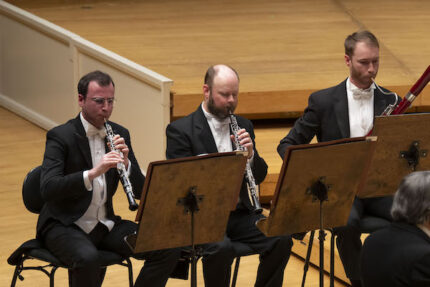CSO musicians take the spotlight in a winning night of Mozart

These final weeks of Riccardo Muti’s tenure as music director have, inevitably, centered on the Italian maestro at Orchestra Hall. But Muti has always been generous in sharing the front of the stage with the Chicago Symphony Orchestra musicians. Thursday night he did so again with the players taking the spotlight for music of Mozart.
Robert Chen doesn’t get credited as often as he should—not only for his exemplary violin playing but for his calm, steady presence as the de facto leader of the CSO strings. The orchestra’s 24-season concertmaster was the soloist in Mozart’s Violin Concerto No. 4 Thursday night.
Mozart was as skillful a violinist as a pianist and wrote his five violin concertos for his own use. These are relatively early works, cast in a galant style, yet the familiar Mozart comes through in the fount of melody as well as the seamless polish of his composing.
Chen’s elegant musicianship has always been eminently well suited to Mozart’s music and so it proved again. The soloist’s light, luminous tone and fluent grace recalled Mozart’s comment in a letter speaking of his own violin performance: “It went like oil.”
Others have found more expressive depth in the Andante, where Chen’s chaste refinement seemed to look back towards the Rococo era rather than forward. Still his pure tone and stylish playing provided its own rewards.
The soloist used Robert Levin’s excellent cadenzas, which deftly and efficiently mine Mozart’s themes while keeping within stylistic parameters (though one cadenza in the finale was probably plenty).
In that concluding Rondeau, Chen’s playing personified the grazioso marking, his light virtuosity rendered with patrician ease and technical facility. Muti’s precise balancing and direction of the small chamber orchestra was a model of sympathetic Mozart accompaniment.
It’s hard to believe that a masterpiece like Mozart’s Serenade in B flat major has not been played at a CSO subscription concert in nearly 30 years. (It was performed in a Covid-era, CSO Sessions streamed concert in 2021.) Granted, the scoring for 13 instruments makes K.361 something of an outlier to program—larger than chamber music without quite being chamber-orchestra dimensions.
Yet the “Gran Partita” is among Mozart’s most remarkable creations. Spanning seven movements, the dizzyingly fecund flow of melody—even by the composer’s standard—is exceeded only by Mozart’s contrapuntal ingenuity and resourcefulness in combining and varying the wind colors.

The scoring calls for double bass, four horns and pairs of oboes, clarinets, bassoons and basset horns—the last an antique instrument, resembling the bass clarinet but higher in timbre. The musicians—nearly all of whom are soloists at some point in the work—were arranged in a semi-circle with Muti eschewing a raised podium for a swivel chair on floor level with the players.
In reality, the “Gran Partita” can be performed sans conductor, especially with players at this level. Still, Muti’s presence was felt in Thursday’s performance. At times there was a whiff of micromanaging and in the Allegro molto of the opening movement one wanted the conductor to let the musicians off the leash. Still, the rhythmic vigor, skillful balancing and degree of dynamic detailing provided by Muti’s direction helped to enhance and illuminate the superb playing of the CSO musicians.
With the technical facility and individual expressive touches of these musicians, highlights abounded—not least the ethereal opening of the Adagio with William Welter’s eloquent, keening oboe solo over the pulsing dark-toned instruments, followed by Stephen Williamson’s clarinet. The opportunity to hear these two sterling musicians exchanging Mozart’s indelible phrases across the Orchestra Hall stage is self recommending.

Also notable was the convo between clarinets and their cousins, the basset horns, in the trio of the first Menuetto, the earthy rhythmic stamp of the second Menuetto, and Williamson’s rustic, village-band charm in the opening theme of the penultimate variations movement.
The performance was capped by a rollicking tempo for the concluding Rondo, the dervish virtuosity thrown off by all concerned with exuberance and high-stepping panache. A visibly delighted maestro heartily applauded the players and made his way around the half-circle, shaking hands with each of them.
The evening began with the Overture to Domenico Cimarosa’s opera, Il matrimonio segreto (The Secret Marriage). Mozart’s influence is evident in this music, not least the three opening chords that echo the curtain-raiser for The Magic Flute, which debuted a year earlier.
Still, Cimarosa has his own quirky qualities. Muti led a taut yet breezy account that started in straight-faced fashion but worked its way to a concluding flourish of wit and joie de vivre.
The program will be repeated 1:30 p.m. Friday, 8 p.m. Saturday and 7:30 p.m. Tuesday. cso.org
Posted in Performances


Posted May 20, 2023 at 10:14 am by Brian
After a disappointing Rachmaninoff 2nd last week, this week’s Mozart was delightful. A real joy. Kudos to Mr. Johnson for his spot on reviews of both concerts.
Posted May 21, 2023 at 1:38 pm by Robert Eisenberg
It was extraordinary to hear nearly an hour of continual interchange between oboe and clarinet with both of the highest quality and the oboe surpassing anything available on YouTube at least to my taste.
The performance of the Cimorosa was even better. For me, it was a miracle to hear the absolute precision of string playing, beyond what one could imagine was possible in unity of intonation, articulartion with utterly graceful style. But the surprise was the playing of oboe and clarinet. Supporting staff perhaps, but Schaefer and Yeh blended perfectly with style and tone quality equal to the first Chairs of the CSO or any other orchestra I have heard.
We are blessed to have them in Chicago!
Posted May 23, 2023 at 11:06 pm by Richard T
This of course is why Muti hired Welter: to play so brightly, so clearly, so uncomplicatedly, so gloriously as he did in the Gran Partita-specially the 3rd movement. I have to admit that it took me a while to get used to his playing. I have become enchanted by the shadows and mysteries of other oboes-evocative of far away places, or capable of sounding marvelously hollow in precise places in Mahler. But when, just before an oboe part, Muti throws open his arms as he looks at Welter, and Welter matches the gesture with an eloquent and expansive statement, presented in the clearest, most direct way possible, you know that this is exactly the oboe sound that Muti wanted for the orchestra.
I have to admit that I wasn’t exactly looking forward to the concert tonight after that dreadful all-Vivaldi a couple of weeks ago, where I was bored to death. “Early Mozart + chamber music” sounded like another lite, skimpy programming to me. Boy! Was I wrong! This was easily one of the most memorable concerts of the season–maybe of many seasons.
Posted May 24, 2023 at 11:10 am by Aaron
The concert was a master class. Best oboe playing I’ve ever heard. I hope they release a record of this one.